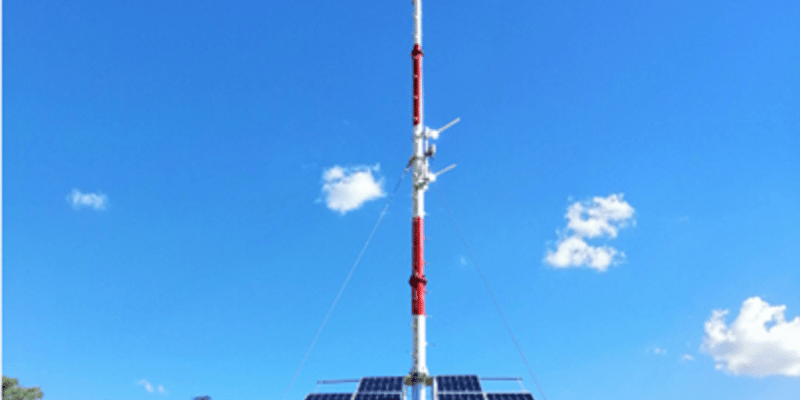At the 27th United Nations Climate Change Conference (COP27), the day of 17 November 2022 is dedicated to solutions to limit global warming. This platform is offered to private and public sector actors to present their innovations for the reduction of greenhouse gas (GHG) emissions. Present at the Sharm el-Sheikh, Huawei, the world leader in technology, is proposing decarbonisation solutions in several sectors, notably telecommunications through the solarisation of network sites.
[PARTNER ARTICLE] After calling for a standard to measure the energy efficiency of telecommunication networks at the ICT for Green conference on 10 November 2022, Huawei is participating in the Solutions Day organised by the Egyptian Presidency of the Cop27. The day’s events will bring together government representatives, businesses and start-ups to share experiences and build partnerships for climate mitigation, adaptation and resilience.
Since the start of COP27 on 6 November 2022 partnerships and funding have already been announced for global warming mitigation. For example, the Australian company Fortescue Future Industries (FFI) has signed a memorandum of understanding with the Kenyan authorities for the production of green ammonia for agriculture, near the Olkaria geothermal field. But decarbonisation solutions are also needed to reduce CO2 emissions from telecommunication networks and accelerate access to connectivity in Africa. Huawei is working to address these key challenges by providing innovative technology solutions.
The challenge of decarbonising network sites
Like water and electricity, access to connectivity is of paramount importance, and the Covid-19 pandemic has demonstrated this with the accelerated dematerialisation of some services due to containment. By December 2021, 43% of Africans had access to the internet according to the Internet Society. At the same time, mobile phone penetration is 97%, or almost one mobile phone per capita.
Such advances are being made thanks to professionals such as Huawei deploying its digital solutions, including network sites. These facilities are necessary, but their deployment is hampered by the low level of electrification in some African countries, especially in rural areas. In a country like the Democratic Republic of Congo (DRC), for example, barely 5% of rural populations have access to electricity.
Solar to reduce CO2 emissions from grid sites
This situation is combined with the climate emergency, which demands that the environment be taken into account in development projects. Instead of diesel generators powering some of Africa’s telecom towers, Huawei, the world’s leading technology company, is focusing on the productive use of solar photovoltaic energy. This environmentally friendly and easy-to-implement solution reduces operating costs and, most importantly, carbon dioxide (CO2) emissions from network sites.
To ensure sustainable access to connectivity, Huawei has developed the Advanced Hybrid Power solution. This innovation integrates a hybrid solar system with an automatically managed electricity storage device using artificial intelligence (AI) to effectively track the changing electricity demand of the grid tower. This innovation is offered in conjunction with other technology solutions and Smart Micro Grids.
The impact in Ethiopia
These solar-powered smart mini-grids have been deployed in rural areas of several African countries, including Ethiopia. In this East African country, mini-grids have been installed in at least 400 sites. They provide access to connectivity while saving 12 million litres of diesel per year, avoiding emissions of 2,850 tonnes of CO2 equivalent over the same period. This eco-friendly solution was awarded a prize in the 21st AfricaCom competition in the “Best Sustainable Energy Solution” category.
In addition to the deployment of these solutions, Huawei supports telecommunication operators for a sustainable access to connectivity, through the deployment of “Green site, Green network, and Green Operation” solutions. In Angola, for example, Huawei is helping to reduce the proportion of diesel used at network sites by introducing solar power and smart lithium batteries. These hybrid solar systems are supported by NetEco, Power Cube and CloudLi solutions.
They enable intelligent management of power systems, in line with Huawei’s “More Bits, Less Watts” strategy on energy efficiency at grid sites.
The contribution of digital and artificial intelligence
Simply put, CloudLi and NetEco solutions help telecom operators accelerate the move away from diesel generators to zero-carbon operations. These solutions can ultimately reduce diesel generator uptime by 75% and network site operating expenses by 40%. For Huawei, digitalisation and the integration of artificial intelligence enable the continuous visualisation, management and optimisation of Smart Grids, which significantly improves the efficiency of operation and maintenance and the reliability of grid sites. Both are essential for simplified site evolution, reduced operating costs and operational safety.
And it is with the aim of combining solar power generation, electricity storage and artificial intelligence at grid sites that Huawei has signed a partnership in 2019 with telecom operator Unitel in Angola. As part of the collaboration, the two partners have deployed 1,050 hybrid solar-powered network sites across the country. To further decarbonise, Huawei is now calling for a standard to measure the energy efficiency of telecom networks. An eco-responsible approach that should inspire other technology providers in Africa.
Article produced in partnership with Huawei







